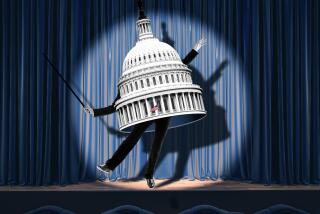NEA Funding: A Quiet but Persistent Issue
- Share via
During the 1992 presidential race, Patrick J. Buchanan’s repeated denunciations of the National Endowment for the Arts forced all of the candidates to take stands on the embattled arts funding agency. When 1996 rolled around, the NEA’s budget and credibility had been so eviscerated that politicians--including Buchanan--tended to mention the agency only in passing.
Today, candidates don’t even raise the issue. Still, a Times survey of the top four presidential candidates in the two major parties reveals that strong feelings remain on both sides, despite the relative calm of recent years.
The division on NEA funding for the most part follows party lines. On the Senate floor John McCain consistently voted against the agency, while Al Gore and Bill Bradley voted in support of it. Texas Gov. George W. Bush, who has never held a congressional office, has no voting record on the arts endowment.
Carrying the conservative banner, McCain’s response to questions from The Times were adamantly against the agency: “I oppose federal funding of the National Endowment for the Arts because of the obscene and inappropriate projects this organization has supported with tax dollars,” he said in a written statement.
“I support block grants of federal funds to the states to support arts and humanities education and endeavors deemed appropriate by state and local officials, while assuring that taxpayer dollars are not used to fund obscene or offensive material.”
In their fight to disassemble the NEA, opponents have long recommended block grants to states as an alternative. The endowment currently gives about 40% of its grant budget directly to state governments, and supporters of the NEA argue that turning only to block grants would eliminate the agency’s primary role as catalyst for exhibitions and performances on a national and regional basis.
Bush was more moderate than McCain while still suggesting the same goals as his GOP opponent.
“I want to continue federal funding for the arts, but give states a greater say in how the money is spent,” Bush said.
Significant funding of the arts in Texas has always come from the private rather than the public sector. John Paul Batiste, executive director of Texas Commission on the Arts, states on the commission’s Web site: “Texas ranks dead last in funding for the arts per capita, behind the other 49 states, the District of Columbia and the six U.S. territories.”
Speaking through their campaign spokespersons, both Gore and Bradley offered strong support for the agency.
“Gore supports continued funding for the NEA,” Gore spokesman Douglas Hattaway said. “In fact, the administration is proposing doubling arts in education programs, which Gore strongly supports.” Earlier this month, President Clinton requested a $52-million increase in the NEA’s annual budget, which would bring it to $150 million. Since 1996, the NEA has held steady at just below $100 million, and the Clinton administration has continually worked to preserve its health.
Bradley spokeswoman Kristen Ludecke’s response was simple: “He has always supported funding for the NEA; he has voted against efforts to cut it and efforts to censor it.”
More to Read
The biggest entertainment stories
Get our big stories about Hollywood, film, television, music, arts, culture and more right in your inbox as soon as they publish.
You may occasionally receive promotional content from the Los Angeles Times.










